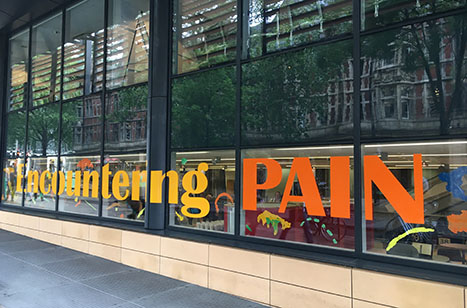Presentation
John Wynne & Tim Wainwright
Encountering Pain: Hearing, seeing, speaking conference
University College London
1 & 2 July 2016
This presentation, abundantly illustrated with both sound and visual materials, will explore the experience of pain by organ transplant patients. Drawing on our previous research and creative practice with heart and lung transplant recipients and our current work with kidney and liver transplant patients and live donors, we will look at the ways in which pain and trauma are normalised. As Victoria Hume writes about one of our participants… ‘Transplant patients live with trauma. To listen to Justine, a lung transplant patient, describe having a drain put in her chest, or her latest collapsed lung, is to appreciate that the greatest dramas are absorbed into everyday lives.’ But despite such acceptance, pain doesn’t lose its transformative power: ‘…these events that happen, and painful at the time albeit they were, looking back on it… I’m still here, I’m still happy. There’s still so much in spite of those painful things.’ (Sanjay, heart transplant recipient). Of course, transplantation itself holds out a powerful promise of transformation, a promise which paradoxically pushes against the ‘sheer aversiveness’ of pain (Scarry).
Pain in the medical setting crystallises several of the attributes of physical pain delineated by Elaine Scarry in the context of torture. Agency becomes a complex and sometimes troubling concept as the patient struggles to maintain identity and a sense of self-control over their body, access to which must be surrendered to varying degrees over long periods of time. In hospitals there is also an ‘almost obscene conflation of private and public’ (Scarry). Although privacy curtains are sometimes employed, sound doesn’t respect such flimsy barriers: ‘Night-time was always more difficult and the noises more disturbing. Then you could hear other patients in nearby rooms and their distress, pain and desperation.’ (Heart transplant recipient Kate Dalziel)
Our sound recordings of patients go beyond the limitations of linguistic expression for understanding pain and suffering: they are made with sensitive microphones at close proximity, permitting an intimacy that can at times be uncomfortable, as one listens to the effects of the malfunctioning body on the voice and hears the paralinguistic evidence of emotion: ‘Feelings of fragility are pervasive and clearly audible in these bedside recordings: every tremor and lapse; the halting and wheezing of breath; the breaks in which speech is overwhelmed by tears; the pain of what is said; the grain of how it is said.’ (David Toop)
Wilfred Bion distinguishes between knowledge of suffering and experience of suffering and emphasises the essential role of experience in emotional development. Although some patients turn down the offer of a transplant (a choice that inevitably leads to other kinds of pain), transplant recipients voluntarily assent to experience pain of varying degrees across the spectrum from physical to psychological. They may arrive at the need for a transplant due to a painful condition, they may spend a tortuously long time on the transplant list ‘either waiting to live or waiting to die’ (Claire Hallas); the medical procedures may bring both intense physical pain and psychological trauma in the form of ‘ITU psychosis’, and many are tormented by the somewhat misguided notion that in order for them to live ‘someone had to die’ (Jill Edwards).
For information about the conference Encountering Pain: Hearing, seeing, speaking, visit the UCL website.


